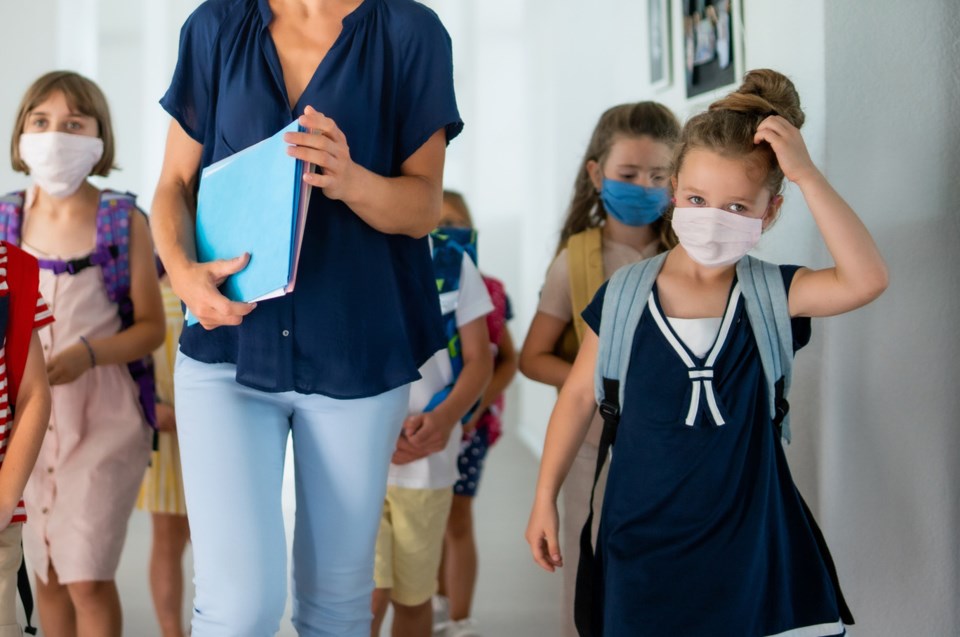It’s time to take additional measures against COVID before the next wave. British Columbians have withstood waves of the COVID-19 pandemic knocking us all down for two years, and we know there are more on the way. We have all been worrying as we scramble to keep ourselves and our family members safe - even if they can't be vaccinated.
Persons caring for children under five and some persons with disabilities have expressed concerns that measures being taken today by some provinces leave them and their families vulnerable. Canadian hospitals are filling up with COVID patients. The B.C. Provincial Health Officer reported Jan. 14 that unvaccinated persons are 17 times more likely to be hospitalized if infected with COVID than vaccinated persons. Unvaccinated persons make up 60 per cent of intensive care patients in BC hospitals and 63 per cent of COVID-related deaths in the province. It is becoming increasingly evident that more needs to be done to flatten the curve and reduce infection rates for vulnerable persons.
Service providers are prohibited from discriminating on the basis of the personal characteristic of disability. This means services provided by both the public and the private sector are required to accommodate people who can not be vaccinated - up to the limits of undue hardship set out under the law.
There are three measures that experts and advocates tell us would help accommodate people most at risk of Omicron’s complications. I’d like to see these acted on as quickly and gently as possible.
Implement and enforce ventilation and filtering requirements that address aerosols in public spaces
To reduce the risk of anyone bringing COVID home to an unvaccinated person, municipalities need to work immediately with their provincial government to upgrade building standards and operation guidelines to keep viral concentration within safe ranges.
Air quality is already an accessibility issue, and it is now critical that aerosol virus particle concentration be at safe levels indoors.
Municipalities need to require effective filtration and decontamination solutions in all heating, ventilation, and air conditioning systems for any indoor public spaces, any indoor worksites, and any rental housing. This requirement should be tied to the annual licensing of businesses to provide an enforcement mechanism. Keeping licensed businesses accountable for these hygiene measures will help slow down the transmission of airborne viruses.
To help manage the financial burden of updates, I would like the federal or provincial governments to support owners of commercial buildings by implementing a program making short-term funding available that amortizes the cost of such improvements over a number of years.
Adequately accommodate households impacted by COVID-19
A September 2021 study by Oxford University and the UK National Institute for Health Research reported one in three patients who contracted COVID was experiencing at least one "Long Covid" symptom three to six months after the event. The most common symptoms were breathing problems, abdominal symptoms, fatigue, pain and anxiety/depression. 1.6 million households have a child five years old or under and there are over 200,000 kids under 5 in BC who cannot be immunized. We must support households that include a person who cannot be exposed to COVID and who can not risk anyone bringing it home from outside. They must not be left behind.
I would like to see the provinces work with the Canadian government to establish a program to provide new funding to support households with a family member who cannot be immunized. Such a program is needed as long as provincial health guidelines allow COVID to be present in indoor public spaces in concentrations likely to result in infection. Because of the lack of prevention in the public space, families have no choice but to avoid all indoor public spaces when one of their family members cannot be vaccinated for medical reasons.
In British Columbia, where I live, additional funding could be made available through an existing provincial assistance program under the Ministry of Social Services and Poverty Reduction.
Require proof of immunization in more indoor public spaces and at the workplace
Let’s have a vigorous conversation about the cost and benefit of requiring widespread proof of immunization.
The BC CDC tells us vaccination plays a critical part in protecting every person who can be immunized against the Omicron strain of COVID, and on Tuesday (Jan. 11) the World Health Organization called for the development of updated boosters to better counter emerging strains.
As long as COVID vaccine boosters only mitigate symptoms without preventing contagion, and as long as indoor air spaces are sufficiently free of COVID virus particles to keep people safe, I would like to see provincial governments require proof of immunization in all indoor public spaces and workplaces wherever possible.
The Canadian Health Minister suggested this constraint makes sense. Making vaccination a requirement will help reduce the already severe strain on our healthcare system and hospitals. Requiring up-to-date immunization will also help reduce the impact of future COVID waves. It will help flatten the curve.
Provincial and federal Centres for Disease Control have been working diligently with health authorities to keep us all safe through health orders that mitigate the fast-moving situation. The success of their effort is clearly visible in hospitalization and fatality statistics that are lower than that many of comparable regions worldwide.
We can make their work even more effective with the three initiatives I described. The political process needed to do this is likely to take too long to be useful for the Omicron strain but it is inevitable more waves are coming.
There’s a lot of thought behind these measures that you can follow up on .
Morgane Oger is a Tech leader passionate about accessibility and human rights. She helped enact laws that protect vulnerable communities. Morgane is the founder of the which helps people stand up for their rights. Follow her on Twitter at or read her .



